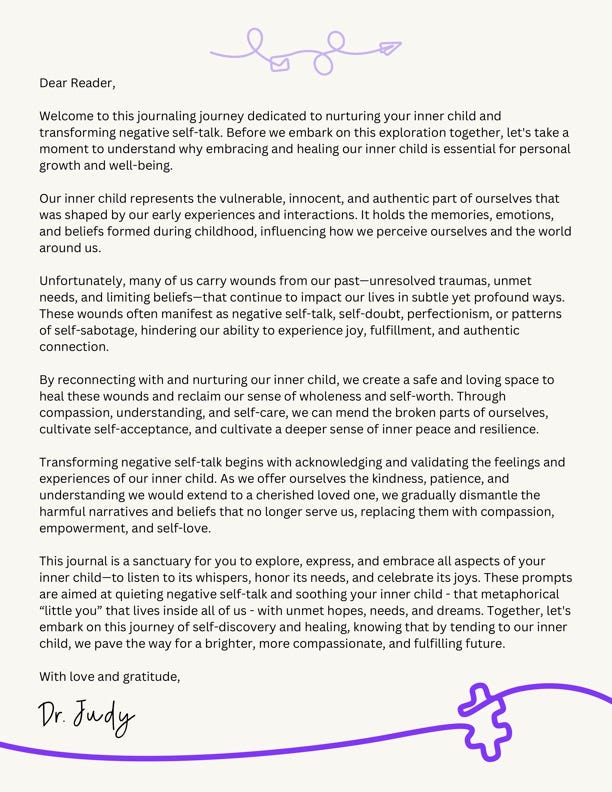We tend to believe our thoughts outright, without questioning them.
And yet, we have over 20-60K thoughts a day on average, so there’s absolutely no way that each and everyone of them hold equal weight or represent our reality…right?
If we adopt thoughts that are unrealistic, unbalanced, and unhelpful, our feelings and behaviors usually follow suit, leading to self-sabotage and emotional suffering.
But there are ways to love your mind (even when it is off base or overly negative) while minimizing the damage these sorts of thoughts can do to your well-being. Below are two of my absolutely favorite techniques that you can do anywhere, anytime.
Thank Your Mind
In Dr. Russ Harris’ book The Happiness Trap, he describes a technique that pays gratitude to your mind and gets you unstuck from unhelpful thoughts.
I’ve adapted his technique to use with many of my patients, who really enjoy the simplicity and effectiveness of it.
The next time you notice your mind starting to say mean and hurtful things to you, talk back to it with a sense of lightheartedness and playfulness. Here are the simple steps to this whimsical (yet effective) exercise.
Give your mind a name. My mind’s name is Betty. When a negative thought comes up, I say, “Thanks Betty, Thanks for sharing.” Or I say, “Thanks Betty, but I got this.” I don’t engage or argue with my mind. Recognize the thoughts and move on, especially if you recognize that the thoughts are unproductive.
Next I say, “Alright (Betty), I’m going to do something else now.”
Then I turn my attention and energy toward doing whatever matters most to me in the moment, whether it’s to keep working at that project without the influence of my inner self critic or going ahead and doing what I was thinking of doing and hoping for the best.
Try this exercise the next time your mind tries to spin a tale of doom and gloom about you or threatens to make you feel less secure in who you are.
Instead of believing that everything your mind says is true or feeling like you must battle with your mind, see your mind as your protector and not your adversary. Align with your mind, let it know you appreciate the input, but that you’re not going to be distracted by the negative talk and will move on to something that really needs your attention.
Similarly, the way you talk to yourself can have a big impact on how you feel.
Yes…But Formula
Another way of dealing with negative self-talk is to reframe it into realistic but encouraging statements using the yes… but… formula.
To do this:
acknowledge something that isn’t going so well right now, and then
acknowledge something that’s going well or something that you’re in the process of doing to improve your circumstances.
An example of this reframing is: “Yes, I made a mistake yesterday at work and it caused my boss to be upset, but I’m going to address what happened and rework the project, and ask my boss about any other ways I can improve on my work.”
Or: “Yes, my friend is being incredibly rude and unempathetic right now, but I can step away from this and focus on my work—then decide how I want to talk to this friend later tonight.”
You are not your mind’s victim. Even though you may not always feel like it, you’re in the driver’s seat, and you have the power to reframe negative self-talk.
Give it a go. Over time, it’ll get easier and easier. And when your mind sneaks in and starts spouting nonsense, you’ll be able to say “no thank you.”
Here’s to your health,
Dr. Judy
Save the date for my LinkedIn LIVE on Friday, May 31, 2024!
Link to join in next newsletter!
Bonus content: 14-day inner child journal
Embark on an exclusive journaling journey dedicated to nurturing your inner child and transforming negative self-talk!
Many of us carry wounds from our past—unresolved traumas, unmet needs, and limiting beliefs—that continue to impact our lives in subtle yet profound ways. By reconnecting with and nurturing our inner child, we create a safe and loving space to heal these wounds and reclaim our sense of wholeness and self-worth.
Embracing and healing our inner child is essential for our personal growth and well-being, and transforming negative self-talk begins with acknowledging and validating the feelings and experiences of our inner child.
Join me on a 14-day journaling journey of self-discovery and healing to pave the way for a brighter, more compassionate and fulfilling future! Click here to download my journal now.
Order here: https://bit.ly/3MvuvvF
Take my attachment styles quiz!
About me:
Dr. Judy Ho, Ph. D., ABPP, ABPdN is a triple board certified and licensed Clinical and Forensic Neuropsychologist, a tenured Associate Professor at Pepperdine University, television and podcast host, and author of Stop Self-Sabotage. An avid researcher and a two-time recipient of the National Institute of Mental Health Services Research Award, Dr. Judy maintains a private practice where she specializes in comprehensive neuropsychological evaluations and expert witness work. She is often called on by the media as an expert psychologist and is also a sought after public speaker for universities, businesses, and organizations.
Dr. Judy received her bachelor's degrees in Psychology and Business Administration from UC Berkeley, and her masters and doctorate from SDSU/UCSD Joint Doctoral Program in Clinical Psychology. She completed a National Institute of Mental Health sponsored fellowship at UCLA's Semel Institute.








